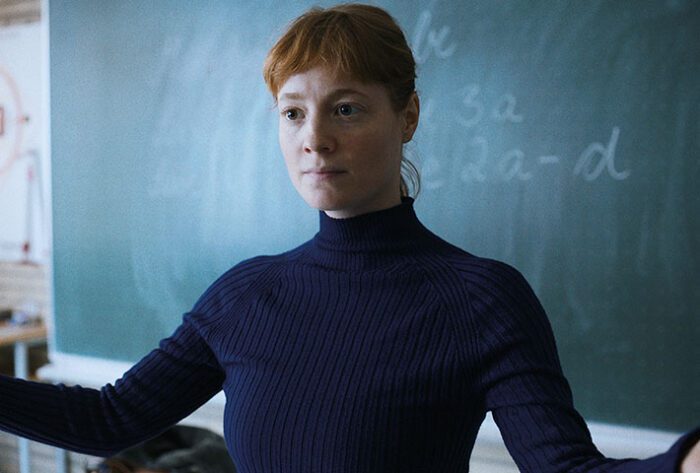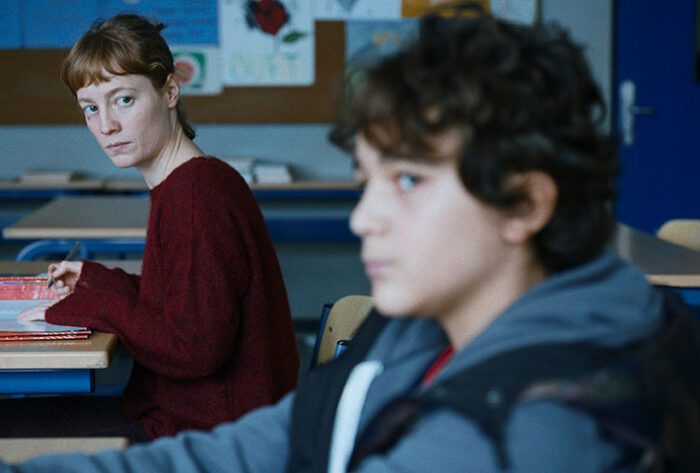Perfectly plotted, expertly directed, and sublimely performed, İlker Çatak’s The Teachers’ Lounge (Das Lehrerzimmer) slowly, subtly ratchets up the tensions at a German middle school with a canny, clockwork precision until they threaten to explode. The film is not a thriller per se, but with each new development you’ll find your pulse pound and palms sweat, just like its sympathetic protagonist, an idealistic, empathetic young teacher who finds herself in the eye of a maelstrom of misunderstandings.
Leonie Benesch plays Ms. (Carla) Nowak, new to the school but already proving her talent for connecting with the diverse, charming students in her seventh-grade class. She balances classroom discipline with an individualized attention based on empathy, managing her students’ personalities and idiosyncrasies while teaching mathematics and physical education. With her sharp intellect, piercing gaze, stoic demeanor, and athletic build, she seems like a perfect fit for the school.

Tensions mount over a small scandal, a series of petty thefts—pencils, coins, etc.—that have the teachers’ lounge abuzz over who might be responsible. It’s a minor matter, at least as first, one that hardly jeopardizes the school’s mission or operations. But as is all too often the case, it’s the divided, often prejudiced response to a crisis, even one this small, that escalates matters. The students are interrogated, a bit threateningly, by the investigating staff. One student sporting some extra cash is questioned, and although he is exonerated, his Muslim parents take clear affront at the accusation. Word gets out among the students, rumors fly, and soon all kinds of simmering intra-group resentments of class and privilege begin to percolate among the school community.
A keen problem-solver, Carla takes issue with the school principal’s draconian (and frankly inept) “zero-tolerance” response to the matter. She’s more keen on prioritizing the students’ emotional well being than on coercing confessions. And so she takes action. Several of them, in fact, each of them perfectly rational and well-intended. But, sadly, each of them turns out to be spectacularly disastrous.
A clandestine video, shot from her laptop, seems to reveal the culprit—a longtime staffer. But the evidence is, like many a video, less than perfectly conclusive. The accused protests her innocence, loudly and convincingly. When word gets out of Carla’s methods, her fellow teachers take offense, a parents’ group gathers the torchlights and pitchforks, and her class rebels. A well-intended interview with the student journalists, intended to put out the fire, also has the exact opposite effect, and soon, the entire school is in tumult. The staffer is placed on leave; her son, who is also Carla’s student, expelled; tensions everywhere at a fever pitch; and poor Carla, who wanted only to solve the problem, a pariah.

Director and co-writer (with Johannes Duncker) Çatak executes every step in this escalating trauma with the subtle precision of Asghar Farhadi’s A Separation as small misunderstandings reveal patterns of prejudice and oppression. Here, the school becomes a microcosm of society, one where the dynamics of power will favor the privileged and oppress the less fortunate. The schoolchildren deserve the kind of empathy and understanding Carla hopes to provide, but the school’s rigid structure simply won’t tolerate even the slightest of fissures: each cracks and grows into a gaping, insurmountable maw.
As the film’s tightly causal plot places Carla in an increasingly untethered situation, Benesch’s performance anchors the film with an unassuming confidence. As Carla, Benesch is tight-lipped, intelligent, persuasive, and competent, but as each step of the plot undermines her, she loses just a little of her rational self-control. In a lesser performer’s hands the role could easily become histrionic, but even when Carla melts down, Benesch keeps her character’s core dignity striving for control. The supporting cast are all strong, and the children, especially, are so convincing the film may have you forgetting its fictional. As Oskar, Carla’s student whose mother is accused, Leo Stettnisch is excellent—his role becomes central to the film’s third act—but every one of them delivers a convincing portrayal.
The film is shot in a traditional 1.37:1 aspect ratio that gives many scenes in the school a claustrophobic feeling. Never does the plot venture out beyond the school’s structure. Çatak and cinematographer Judith Kauffman know how to arrange characters and other elements of the mise en scène to emphasize like a Rainer Werner Fassbender interpersonal relationships and power dynamics, if without much trace of artifice. (A fellow teacher played by Sarah Bauerette seems like she might have teleported straight from Angst essen Seele auf.) The film’s tight edit (by Gesa Jäger) paces the film as sprightly as any thriller, if without any artifice or gimmickry: the plot simply cooks along, one event causing the next, until the school seems ready to explode.
In the end—and it’s an ending I fear American audiences won’t quite get, a good deal less conclusive than most Hollywood fare—those stolen pencils and coins no longer matter one whit. What they led to was something far more tragic, and The Teachers’ Lounge demonstrates how fragile each child’s wellness can be. I write this the day after, as is all too often the case here in the States, a school shooting in a state neighboring mine, just 40-some miles from where my daughter lives, claimed the life of a victim the same age as one of Ms. Nowak’s students. That shooting was one of hundreds in the U.S. dating back to 2018, a number that dwindled only temporarily during the lockdowns of the coronavirus pandemic.
When the expelled boy sulks back into the classroom carrying a too-large backpack, it’s impossible, for me at least and I suspect for many American viewers, not to fear the absolute worst. The Teachers’ Lounge, though, is more of a character study and exploration of intra-group dynamics than it is an exploitative thriller. And with its excellent script, performances, and pacing, it’s absolutely worth watching, certain to rank among the year’s best.




